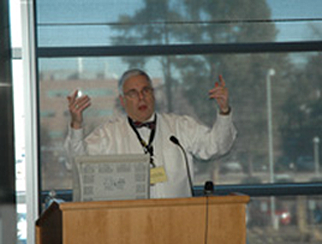An auspicious time for teaching and learning
It wasn't until he became a dean of the School of Medicine in 1990 that Richard Krugman, M.D., realized that not all people are like pediatricians.
"My father was a pediatrician ... I came out here to work in the Department of Pediatrics (in the CU School of Medicine), where I spent 17 years on the faculty, and then I became acting dean," Krugman told an audience Friday morning at the President's Teaching Scholars Program (PTSP) Spring Conference on Learning and Teaching on the Anschutz Medical Campus.
More than 100 faculty members from all University of Colorado campuses attended the fourth annual PTSP conference. The daylong session featured a variety of speakers, panels and interactive activities focused on improving learning and teaching.
The broadening of the world when Krugman became dean illustrates the kind of reawakening that anyone in academia can experience.
"Leaders and others like teachers are sometimes born that way, but it is possible to be born again in education," he said during his talk titled “Reflections on the Growth and Development of an Educator.” "If one keeps an open mind and has the flexibility to be able to learn -- that really is the core of what we're doing here."
During his long career at the CU School of Medicine, Krugman said he's had opportunities to go elsewhere, but he recognized that he could have several careers at one place. He said what's mattered to his career are: family support, mentors, opportunities (take them when they come), and flexibility.
On the latter, Krugman said Ray Helfer, a fellow CU faculty member, once told him that other people don't create problems in your job. "The job is problems, and all jobs have them. And our job is actually you either solve them or help people solve them. Or sometimes, when you can't, it's better to just say we can't solve it, move on, we'll try again next year."
Krugman is currently Vice Chancellor for Health Affairs and the Dean of the School of Medicine.
"I think one has to recognize where one can work, and where the joy is," he said. He's enjoyed watching the transformation of the medical campus over 20 years. "Ultimately, academic administration is about providing faculty, staff and students the opportunity to do what they do best and that means you've got to provide space and resources."
Krugman said that when he came to the university in the 1970s there wasn't any training on how to teach. Times have changed for the better, he said, adding that today "our trainees need and should have the best teachers, the best educators they can. God knows they are paying more and more for it."
In one breakout session, Jessica Campbell and Rachel Swigris, both assistant professors on the Anschutz Medical Campus, explained how they are incorporating mindfulness -- awareness of your physical, mental, spiritual and emotional being -- into their work. Campbell got the room to take part in yoga poses, while both professors talked about ways to reduce stress, increase energy and enhance meaningfulness in your life.
In terms of teaching, Swigris said, "the more detailed you can be in compliments, the more gratitude you show ... the more valued (your students) feel. When people feel valued, they have more energy."
Mary Ann Shea, director of the PTSP, said these are fast-changing and auspicious times in education, requiring innovative ways to teach.
"Faculty members have to ... renew a curiosity for how to become the best teacher they can be and how to create learning environments for students who are so different from us," she said. "We didn't study and learn in education the way students do now."


